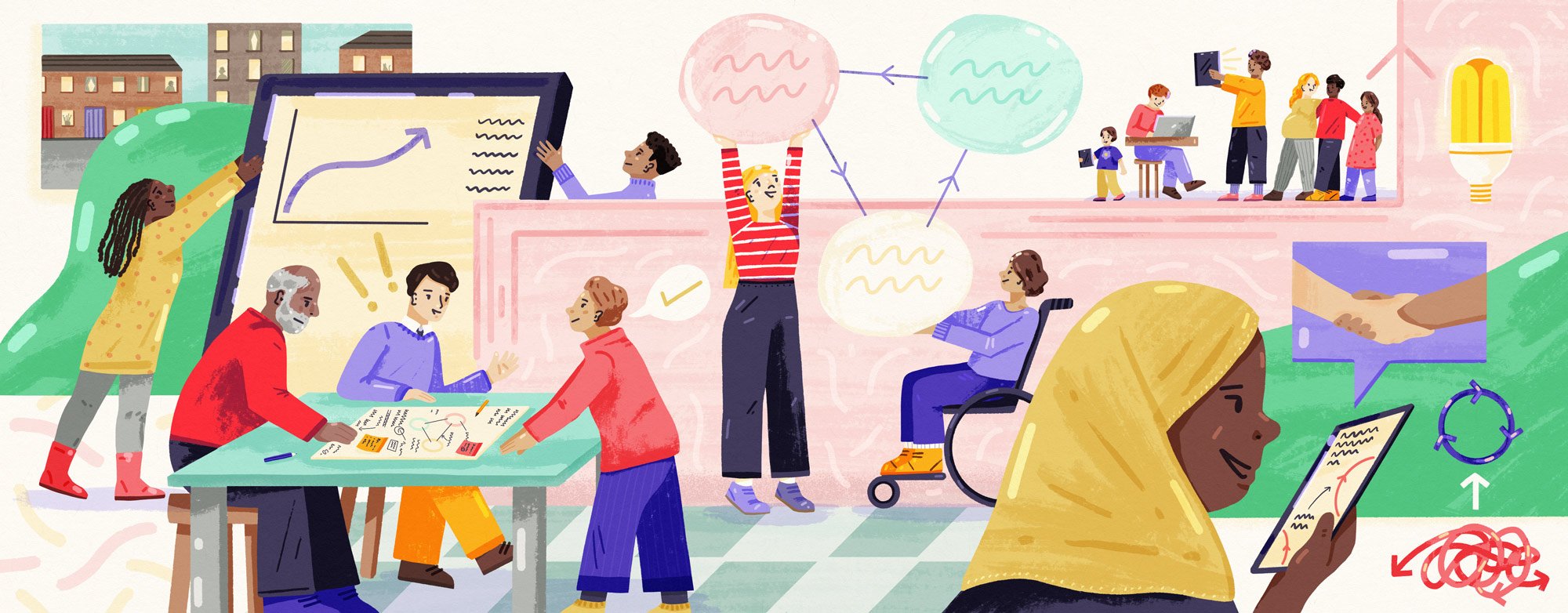Community Tech: Reflections on our first funding round
Community Tech, illustration by Elly Jahnz
Innovation happens everywhere. It’s happening in skate parks and community radio stations, in community energy companies and social care collectives, in community pubs and libraries. Across the country, community businesses are creating their own community tech - technology that local people can hold to account, delivers local benefits, and that fully meets their needs.
Power to Change and Promising Trouble are working together to unleash the power of community tech, ensuring communities have access to and ownership of technology that meets their specific needs.
A total of 39 applications for the first Power to Change community tech funding round were submitted in November last year. Makers & Maintainers is a two-year funding programme to support and grow the community tech sector, helping community businesses to support the maintenance, care and repair of existing community tech.
Applications went through several rounds of review and assessment and due diligence checks before a shortlist was created. We’re really excited about all ten of the successful organisations and projects: we hope that not only do they see the benefit of the funding within their organisations, but also that we have a lot to learn from their work.
We also learned a lot from delivering this first round. We were very pleased to receive a large number of applications, affirming our sense that ongoing maintenance and development work is really difficult to fund. The fund was explicitly tailored to support organisations already involved in community tech, so we were not surprised to see many organisations and projects that we already knew about, and we’re looking forward to their work being an inspiration to many others.
Where next?
We also got a lot of pointers as to what we do next, where we might focus our efforts, and how we can improve future funding rounds.
Diversity - there are concentrations of organisations making community tech in particular parts of the country: mainly the North West, South West and London and the South East. This is not to say that there aren’t fantastic things happening elsewhere, but these are the clusters we saw clearly in the funding applications. While there is great benefit to those working in these clusters, offering local peers to work alongside and the potential for some local infrastructure, we don’t want this programme to only benefit those places where community tech is already up and running.
Equally, we recognise that, in the main, community tech lacks some diversity in the individuals that are directly involved. We already knew this before the funding process, but this really reinforced it. Many community organisations have an explicit focus on serving a diverse community in their overall remit, and there is strong representation of women and disabled people in the successful applicants to the fund, but the individuals involved in making and maintaining community tech tend to be white, often from more privileged socio-economic groups.
All applications from minority-led organisations or with strong representation of minoritised groups among their beneficiaries were double checked by several people to minimise the risk of unconscious bias, yet we still ended up with a group of successful applicants where some groups are less represented than others: we have to conclude that we were drawing from a pool that lacks diversity in some areas. This has solidified our commitment to understanding why this is the case, and what we can do to make community tech and the funding programme as accessible as possible. This is an absolute priority for us during 2023.
Limitations of the funding - because this first round was entirely funded by Power to Change, which focuses on supporting community businesses, organisations had to meet their criteria in terms of how they are organised and constituted. Unfortunately, this meant that some fantastic organisations doing great things weren’t eligible for funding. That’s why one of our priorities this year is to talk to other funders about community tech, and see where we might align our interests and open up more funding opportunities for a broader range of community-based organisations.
Governance and accountability - some strong applications had to be discounted because they could not demonstrate that they were truly accountable to the communities they serve. This means concrete mechanisms for people to be involved in decision-making, meaningful opportunities to shape the functioning and direction of the organisation. We recognise this is a challenge for many organisations, however committed they are to community involvement.
This is a topic we are keen to explore more this year, working alongside community organisations to understand the support they need.
Stage in community tech development - some applications were just not quite at the right stage of development for the fund. Some great ideas came forward that were a bit too early in their journey for the remit of this fund. Early stage ideas, and finding the time and space to really explore properly, will be the focus of a future funding round, so watch this space.
How you can get involved
We’re working on supporting the growth of community tech beyond the funding programme, and we’re actively bringing new partners together, including funders, research organisations, community infrastructure organisations, policymakers and more.
If you’d like to know more, you can read our first report: The Case for Community Tech and look up our first multi-authored publication: Connected People and Places. Sign up for our Community Tech mailing list for more details about the fund.
We’d love to hear from you as we shape this exciting, growing field in 2023.


